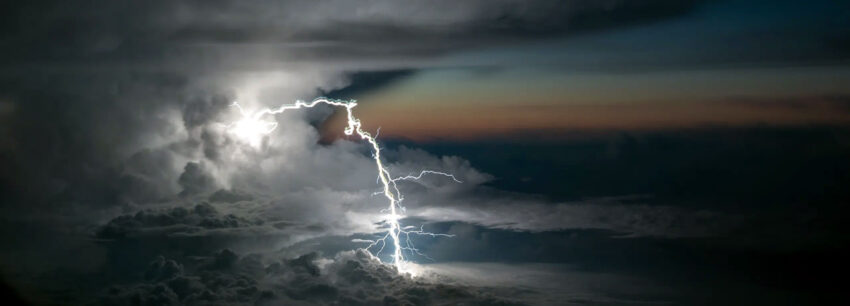
The Lightning- Part II
It is Saturday. Nature, sunrise with the warming of spring, – proceeds impassively. The bedrock of reality is cause and effect as far as I can tell. I find comfort in that. There, in Nature is my refuge from being whipsawed by revulsion, or by terror, or by avarice, by hope, or by _____. Go ahead, freely add one of your own habituated responses to external events. The impassivity of the cosmos is a solace to me.
I read another “sign of our times” in today’s New York Times.
The Trump administration has purged certain books from U.S. Naval Academy’s library: “I Know Why the Caged Bird Sings” by Maya Angelou is gone, while “Mein Kampf” remains.
This is Part 2 of yesterday’s post, a continuation of the conversation between Zarathustra, the itinerant sage, and the idealist youth, who he encounters seated on the ground, his back against a solitary tall tree. The youth, tormented by the clash between his deeply felt ideals, and the consequence of loneliness that is inevitable to all artists, to all who are courageous and creative –expresses the tenuous, scant grasp which he/she has upon his self-identity. In a contemporary idiom ‘he hardly knows who he is anymore.’
To this “true confession” of soul Zarathustra replies:
Yes, I know your danger.
But by my love and hope I appeal to you:
cast not your love and hope away!
Noble you feel yourself still,
and noble others also feel you still,
though they bear you a grudge and cast evil looks.
Know this,
that to everybody a noble one stands in the way.
Also to the good, a noble one stands in the way:
and even when they call him a good man,
they want thereby to put him aside.
The new, would the noble man create,
and a new virtue.
The old, wants the good man,
and that the old should be conserved.
But it is not the danger of the noble man to turn a good man,
but lest he should become
an arrogant boor,
a mocker,
or a destroyer.
Ah! I have known noble ones
who lost their highest hope.
And then
they slandered all high hopes.
Then lived they shamelessly in temporary pleasures,
and beyond the day had hardly an aim.
“Spirit is also voluptuousness,” – said they.
Then broke the wings of their spirit;
and now it creeps about,
and defiles where it gnaws.
Once they thought of becoming heroes;
but sensualists are they now.
A trouble and a terror is the hero to them.
But by my love and hope
I appeal to you:
Cast not away the hero in your soul!
Maintain holy your highest hope!
–Thus spoke Zarathustra.
Thus Spake Zarathustra, by Friedrich Nietzsche, trans. by Thomas Common, The Tree On The Hill No. 8
A final word of comment: A desire to “create” the future is uncommon, rare, special and necessary if humankind is learn to love him/herself, to cherish this planet as our living, our abundantly adequate home. The alternative to becoming one’s own hero is to become an “arrogant boor, a mocker, a destroyer.” A “hero” stands in the way of the “herd man,” who simply ‘wants things to return to the way he/she imagines them to have been.’ (MAGA)
The response of Zarathustra to that, speaks for itself!
We have a stellar tune by David Bowie, Heroes, to guide you and I on our journey.
Be your own Hero, one day at a time!
2 thoughts on “The Lightning- Part II”
I like to believe that my attempts at altering the course of humanity are not futile, or fueled by self-aggrandizement, or delusional. But I don’t know. Most likely, from a pragmatic perspective, it’s probably a bit of all three. And the resulting sensations are much like those felt by the young person in Nietzsche’s story; fear, frustration, and isolation. I am also fortunate to have my own Zarathustra in the form of the writer of these blogs. To whom I am eternally grateful.
If one is not troubled, then what does it mean to be a human being? The friction of dissonance, inevitable as a language enabled mammal, is what drives us to transcend ourselves. That is the antidote to regression.